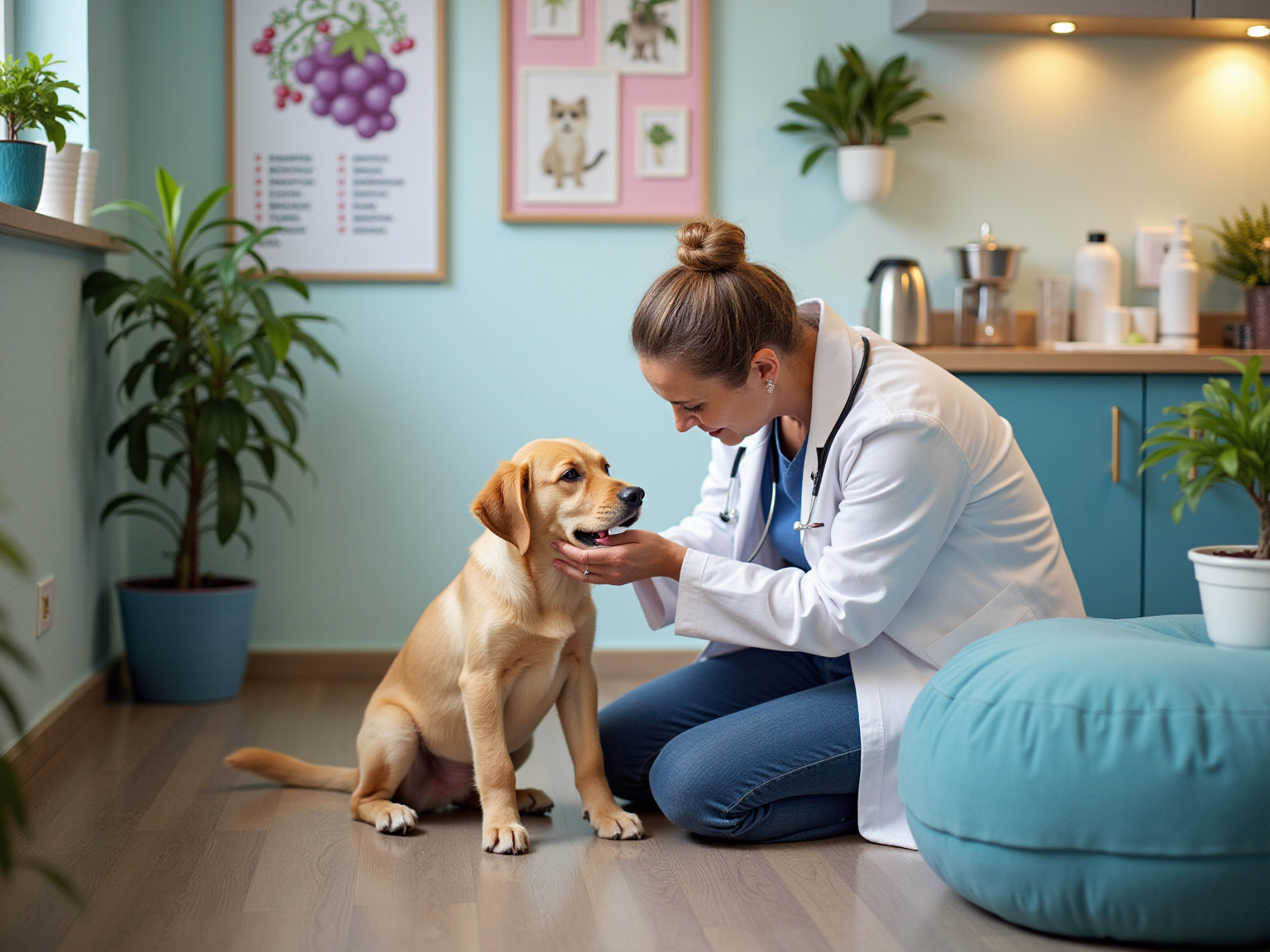
Can Dogs Eat Grapes? Understanding Risks and Safe Alternatives
Overview
As a loving pet owner, it’s crucial to be aware that dogs should not eat grapes. These seemingly harmless fruits can lead to severe health issues, including acute kidney failure, even in small amounts. This knowledge can be alarming, and it’s perfectly natural to feel concerned for your furry friend’s well-being.
- All types of grapes and raisins are toxic to dogs, which underscores the urgency for pet owners to act swiftly.
- If your dog consumes these fruits, seeking immediate veterinary care is essential.
- Early intervention can significantly improve recovery outcomes, providing hope and reassurance during a distressing time.
Remember, you are not alone in this; many pet owners share these concerns, and together, we can ensure our beloved companions receive the best care possible.
Introduction
The dangers of grapes and raisins for dogs weigh heavily on the hearts of pet owners everywhere. These seemingly innocent fruits can lead to acute kidney failure, and even the tiniest amount can pose a significant risk to our beloved companions.
Despite thorough veterinary research, the exact toxic agent remains elusive, making it all the more essential for dog owners to stay alert and informed. Symptoms can appear suddenly, often within hours of ingestion, highlighting the urgent need for immediate action and awareness.
As we navigate the evolving conversation around pet safety, understanding the risks associated with these fruits is vital for safeguarding the health and happiness of our furry friends. This article explores grape toxicity, the symptoms of poisoning, and the crucial steps to take if a dog ingests grapes, while also offering safe dietary alternatives to ensure our pets remain healthy and joyful.
Explore Grape Toxicity: Why Grapes Are Dangerous for Dogs
As pet owners, it’s heart-wrenching to learn that when considering if can dogs eat grapes and raisins, they can be extremely harmful to our beloved canines, potentially leading to acute kidney failure. While the specific toxic agent remains a mystery, even a tiny amount can trigger serious health complications. It’s important to recognize that all types of grapes—whether red, green, or dried—carry this risk. Symptoms of toxicity can arise unexpectedly, underscoring the need for us to remain vigilant and proactive in safeguarding our pets from these fruits.
Recent statistics reveal that even a single raisin can pose a significant threat to animals, reminding us that while our focus is on dogs, the dangers extend to other pets as well. In real-life cases, canines have faced toxicity from grapes, which leads to concerns about whether can dogs eat grapes, necessitating urgent medical intervention. This reality can be alarming for any pet lover, as we all want to ensure the health and happiness of our furry friends.
Veterinary specialists consistently warn us about the hazards these fruits present. One compassionate veterinarian wisely noted, “Stay strong, time helps heal :)”—a gentle reminder of the resilience we need when navigating our pets’ health crises. With ongoing research into the toxicity of certain fruits and their effects on canines, it’s crucial for us to stay informed about the risks associated with fruit consumption. The consensus among veterinarians is clear: to protect the well-being of our dogs, we need to address whether can dogs eat grapes. Together, let’s prioritize their safety and health, ensuring they live happy, fulfilling lives.
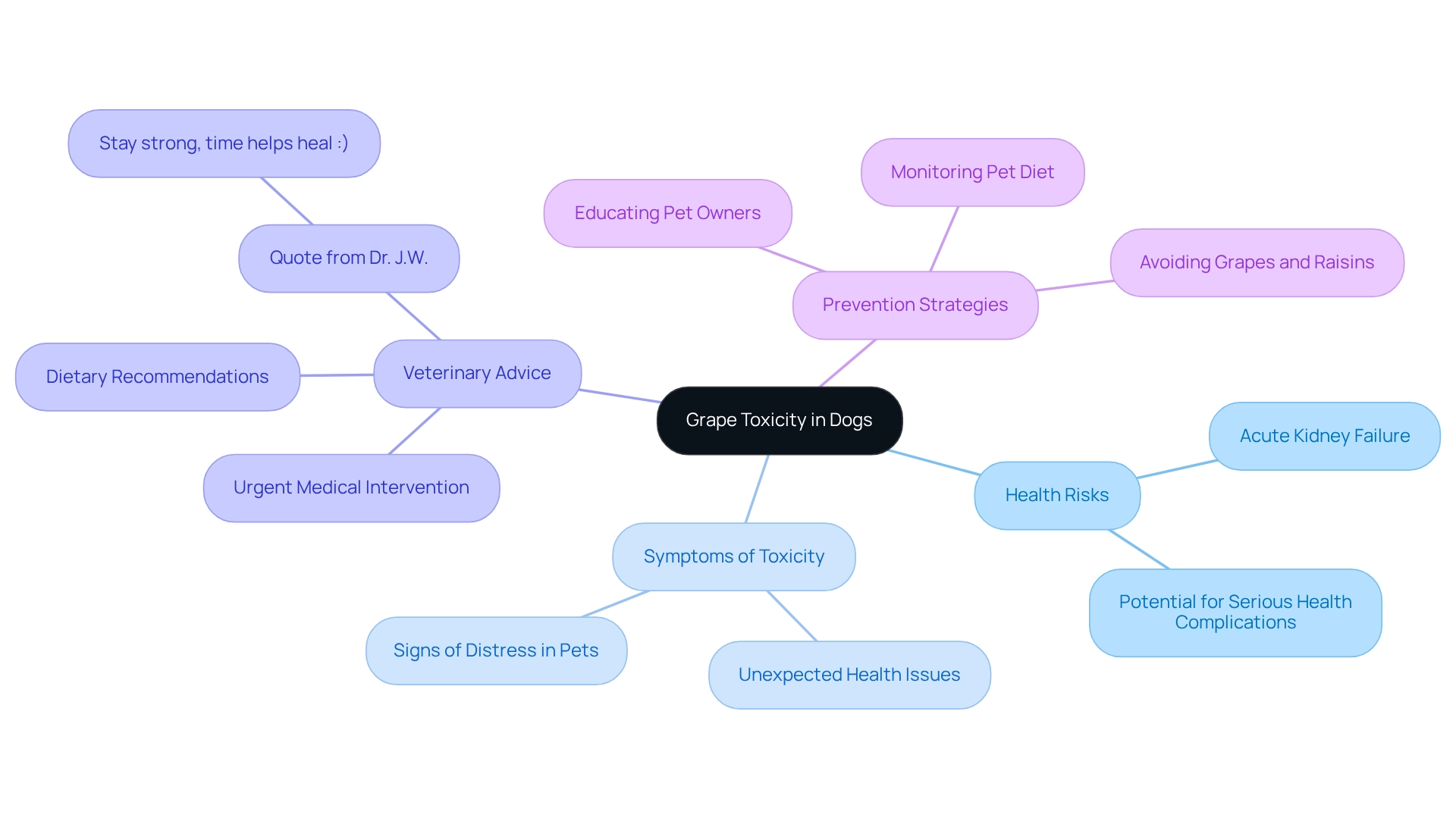
Identify Symptoms of Grape Poisoning in Dogs
Noticing signs of fruit toxicity in your beloved canine can be a distressing experience, often appearing within 6 to 12 hours after they’ve consumed harmful fruits. You might observe common indicators such as:
- Vomiting
- Diarrhea
- Lethargy
- Loss of appetite
- Abdominal pain
As these symptoms progress, your furry friend may experience increased thirst and urination, which can later shift to reduced urination, signaling a potential risk of kidney failure. It’s important to understand that even small amounts—just 0.03 ounces (720 mg)—of these fruits can trigger harmful reactions in dogs weighing around 44 pounds (20 kg).
If you notice any of these concerning symptoms after your dog has eaten grapes, please don’t hesitate to seek help from a veterinarian right away. A veterinarian emphasizes, “If you believe your dog might have consumed fruits or raisins, it’s important to ask, can dogs eat grapes, and reach out to your veterinarian promptly!” Early detection and intervention can significantly improve recovery chances, as untreated cases may lead to severe complications, including renal failure within 24 to 48 hours. Remember, prompt veterinary care is crucial; inducing vomiting may be necessary, but this should only be done under professional guidance to prevent further complications. Your pet’s health and well-being are paramount, and taking swift action can make all the difference.
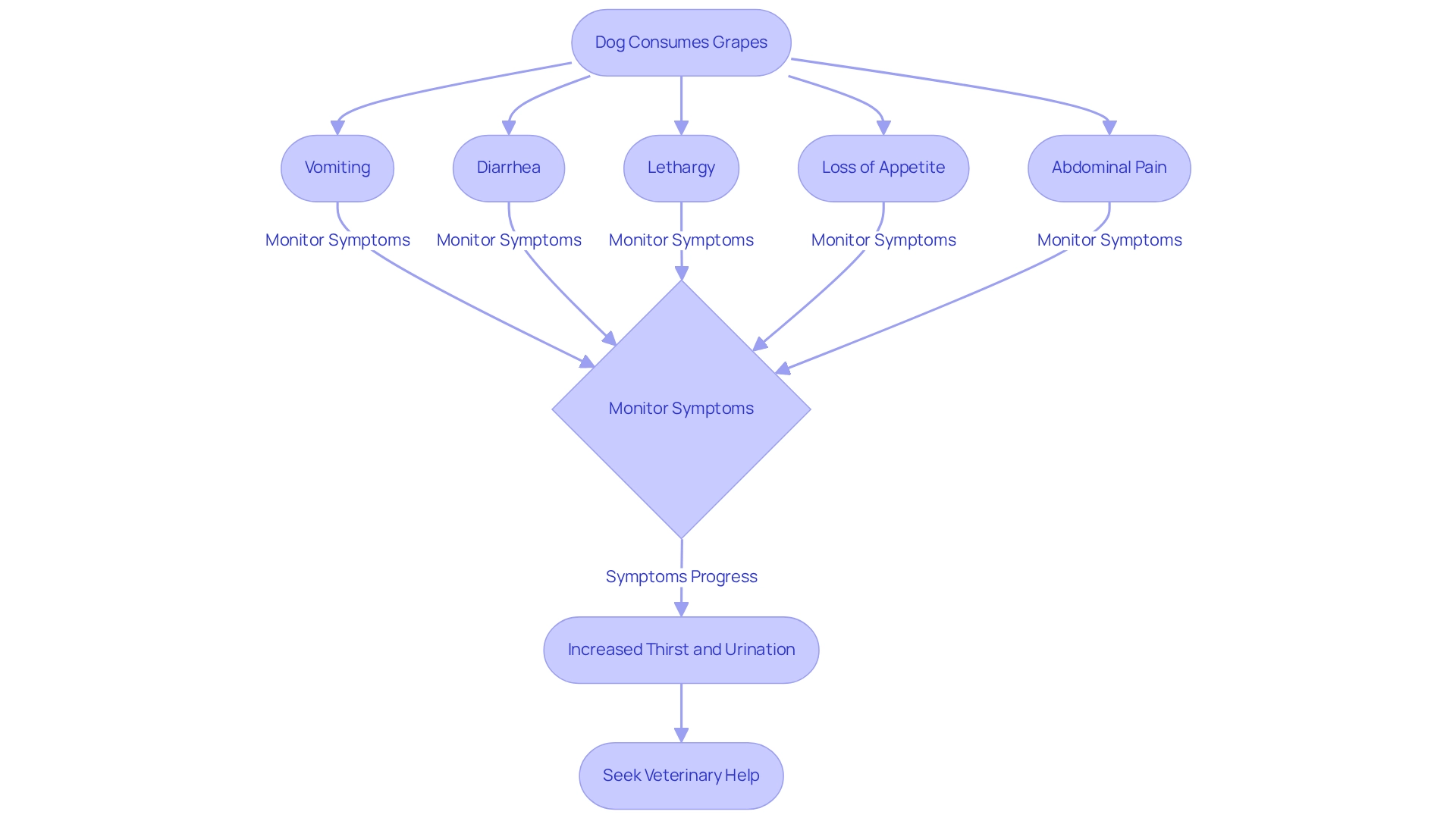
Take Action: What to Do If Your Dog Eats Grapes
If your dog has consumed those fruits, it’s crucial to act quickly. We understand how distressing this situation can be, so please contact your veterinarian or an emergency animal poison hotline immediately—don’t wait for symptoms to appear. Depending on when and how much was ingested, your veterinarian may suggest inducing vomiting to minimize toxin absorption, ideally within a few hours after ingestion. In some cases, administering activated charcoal can help bind the toxins and lessen their effects. Continuous monitoring and supportive care, such as intravenous fluids, may be necessary to ensure kidney function and reduce the risk of long-term damage.
We know that neurological symptoms, like tremors, weakness, and seizures, can stem from grape toxicity, which leads us to wonder, can dogs eat grapes? As Lynn Guthrie wisely points out, “In severe cases, grape toxicity can damage the nervous system and cause tremors, weakness, and even seizures,” highlighting the urgent need for veterinary intervention. It’s essential for pet owners to recognize that gastrointestinal decontamination is often advised when clinical signs emerge, reinforcing the importance of swift action.
Real-world examples show how effective timely veterinary responses can be, with many cases successfully managed through appropriate emergency measures. Additionally, animal insurance plans, such as those offered by Pumpkin, provide peace of mind for pet owners, ensuring they can access the best care for their beloved companions in unexpected situations. The case study titled ‘The Risks of Grapes for Dogs’ serves as a reminder of how common accidental ingestion can be, specifically addressing the question of can dogs eat grapes and emphasizing the necessity for pet owners to be proactive in protecting their furry friends from hidden dangers.
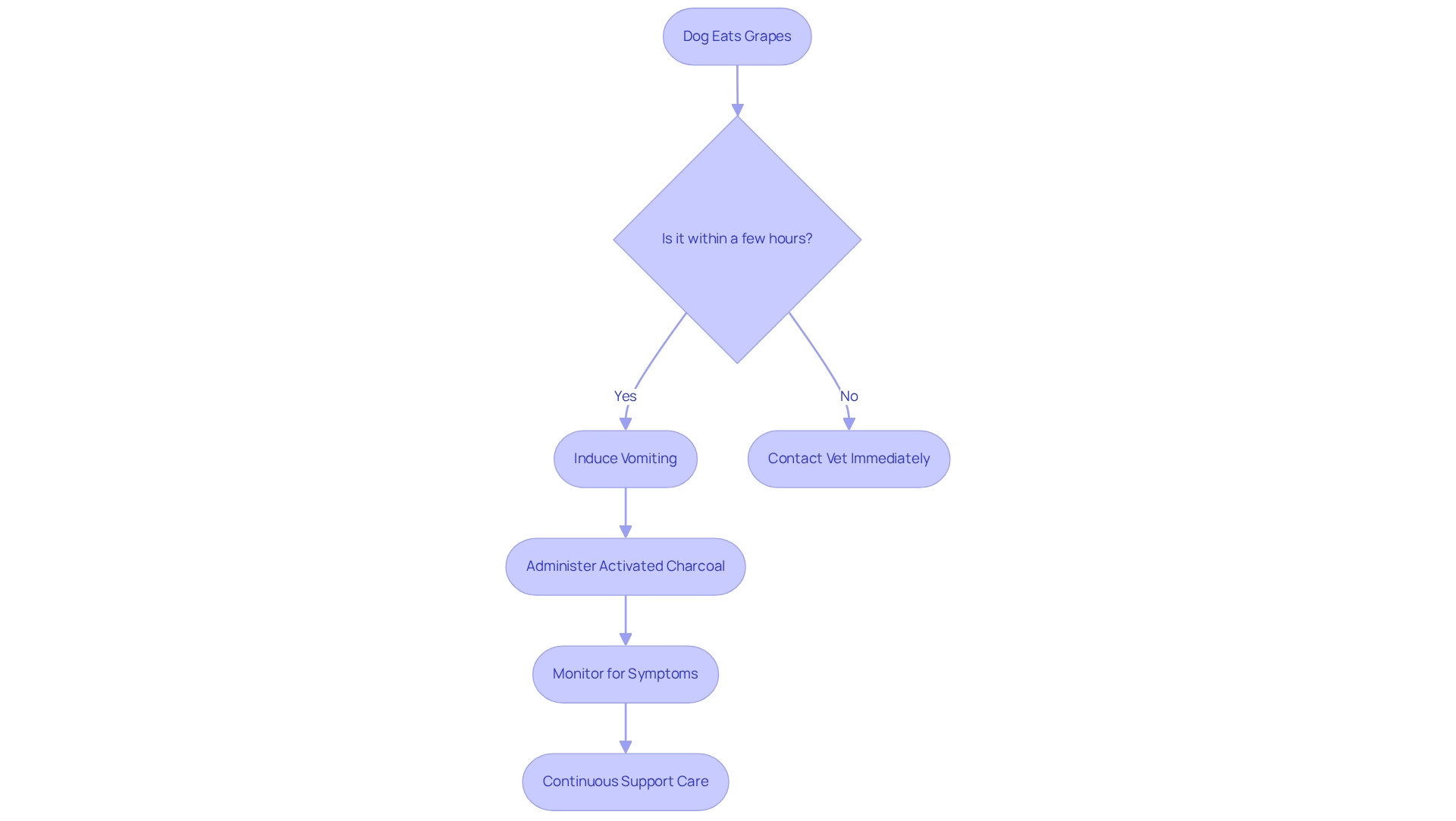
Prevent Grape Toxicity: Safe Alternatives and Precautions
To successfully avert toxicity in our beloved animals, it’s crucial to educate ourselves and those around us about the risks associated with certain fruits, particularly regarding the question of can dogs eat grapes. These seemingly innocent snacks can lead to severe health issues, including acute kidney failure, even in small amounts. It’s vital to keep dried fruits out of reach of our pets and ensure that family members and visitors are aware of these dangers. If you suspect that your dog has consumed dried fruit or berries, treat it as an emergency and seek veterinary care promptly.
Instead of grapes, consider offering your dog safe fruit alternatives like:
- blueberries
- apples (without seeds)
- bananas
- watermelon
Always remember to remove seeds, pits, and peels from fruit before feeding. These safe options not only help avoid toxicity but also provide essential nutrients that contribute to your dog’s overall health. Regular consultations with your veterinarian can help tailor your dog’s diet to their specific health needs while steering clear of harmful foods.
Incorporating safe fruits into your dog’s diet can be both enjoyable and beneficial. For instance, blueberries are rich in antioxidants, while bananas provide potassium. It’s important to recognize that even the consumption of a minor quantity of these fruits can lead to significant health issues in certain canines, making it crucial to understand whether can dogs eat grapes. By prioritizing safe alternatives and maintaining open communication with your vet, you can ensure a healthy and happy diet for your furry friend. A case study titled “Can Dogs Eat Raisins?” explicitly states that dogs should not eat raisins, as they are toxic and can lead to serious health problems, including acute kidney failure.
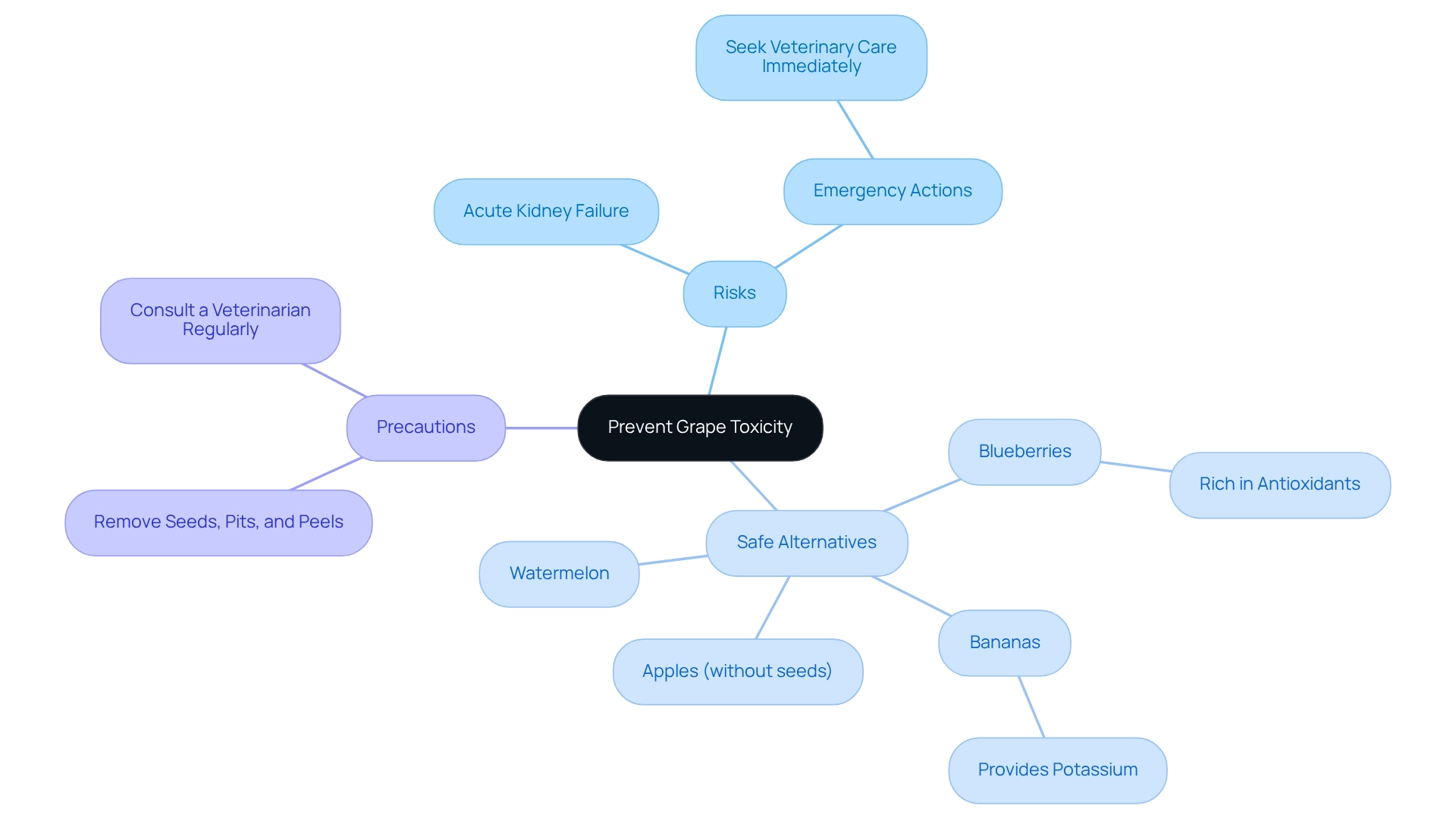
Conclusion
Understanding the dangers of grapes and raisins for dogs is essential for every caring pet owner. These seemingly innocent fruits can lead to serious health risks, including acute kidney failure, even in small amounts. The unpredictable nature of grape toxicity highlights the importance of remaining vigilant and proactive in preventing our beloved pets from exposure to these fruits. Recognizing the symptoms of grape poisoning is crucial; early intervention can significantly enhance recovery outcomes.
When faced with the possibility of grape ingestion, immediate action is vital. Reaching out to a veterinarian or an emergency animal poison hotline can make a significant difference in your pet’s well-being. Prompt veterinary care, including potential decontamination measures, is necessary to reduce the risk of serious complications. Additionally, staying informed about safe alternatives to grapes and creating a secure environment for our pets can help prevent dangerous situations from occurring in the first place.
Ultimately, prioritizing pet safety involves a heartfelt commitment to education and proactive measures. By understanding the risks associated with grapes and exploring safe dietary alternatives, pet owners can ensure the health and happiness of their furry companions. It is essential to foster an environment where pets are shielded from hidden dangers, allowing them to thrive and enjoy a joyful life.
